puertoreggae.com
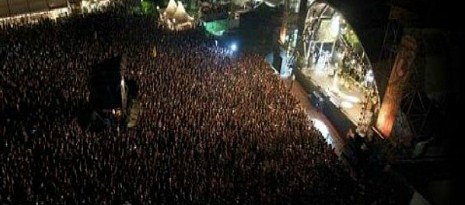 Steel Pulse se formó en la zona de Handsworth en el interior de Birmingham, Inglaterra en el 1975. La banda fue fundada por los compañeros de clase David Hinds como compositor principal, cantante y guitarrista, Basil Gabbidon también en la guitarra y Ronnie “Stepper” McQueen como bajista. Los tres venían de familias de clase trabajadora inmigrantes de las islas del Caribe y sin mucha experiencia en la música. Dedicaron su tiempo a mejorar su técnica mayormente practicando material roots inspirado en los Wailers y Burning Spear, entre otros prominentes artistas Jamaiquinos. McQueen sugirió el nombre para la banda Steel Pulse inspirado en un caballo de carrera del mismo nombre. Completaron la alineación con Steve “Grizzly” Nisbett en la batería, Selwin “Bumbo” Brown en los teclados y voces, Alphonso “Fonso” Martin en la percusión y voces, y el vocalista Michael Riley.
Steel Pulse se formó en la zona de Handsworth en el interior de Birmingham, Inglaterra en el 1975. La banda fue fundada por los compañeros de clase David Hinds como compositor principal, cantante y guitarrista, Basil Gabbidon también en la guitarra y Ronnie “Stepper” McQueen como bajista. Los tres venían de familias de clase trabajadora inmigrantes de las islas del Caribe y sin mucha experiencia en la música. Dedicaron su tiempo a mejorar su técnica mayormente practicando material roots inspirado en los Wailers y Burning Spear, entre otros prominentes artistas Jamaiquinos. McQueen sugirió el nombre para la banda Steel Pulse inspirado en un caballo de carrera del mismo nombre. Completaron la alineación con Steve “Grizzly” Nisbett en la batería, Selwin “Bumbo” Brown en los teclados y voces, Alphonso “Fonso” Martin en la percusión y voces, y el vocalista Michael Riley.
Al principio se le hizo difícil a la banda conseguir sitios donde tocar ya que los dueños de clubes estaban reacios a darles espacio por su temática rasta subversiva. Por suerte, para esa época el movimiento punk, que iba abriendo puertas a través de toda Gran Bretaña, se identificó con el sentimiento de protesta del reggae.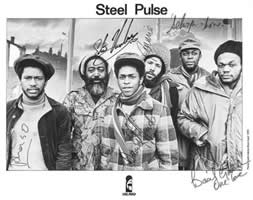 La banda consiguió guisos abriéndole a bandas punk y new wave como The Clash, The Stranglers, Generation X, The Police y XTC, así creando una buena base de seguidores. Siguiendo con las costumbres de la época, desarrollaron un show teátrico con disfrazes burlándose de las figuras de poder en Londres. Steel Pulse sacó dos sencillos, “Kibudu Mansetta and Abuku” y “Nyah Love” bajo un sello independiente antes de llamar la atención de Island Records luego de abrirle un concierto a Burning Spear.
La banda consiguió guisos abriéndole a bandas punk y new wave como The Clash, The Stranglers, Generation X, The Police y XTC, así creando una buena base de seguidores. Siguiendo con las costumbres de la época, desarrollaron un show teátrico con disfrazes burlándose de las figuras de poder en Londres. Steel Pulse sacó dos sencillos, “Kibudu Mansetta and Abuku” y “Nyah Love” bajo un sello independiente antes de llamar la atención de Island Records luego de abrirle un concierto a Burning Spear.
El primer sencillo de Steel Pulse con Island Records fue el clásico “Ku Klux Klan”. Bien al estilo visual y de protesta de la banda, para este tema los músicos se presentaban controversialmente en túnicas y capuchas blancas. El tema apareció en el álbum Handsworth Revolution del 1978 que rápidamente fue nombrado como un clásico del reggae Británico por fanáticos y críticos gracias a esta y otras canciones como “Macka Splaff,” “Prodigal Son,” y “Soldiers”. Riley dejó la banda antes de la segunda producción del 1979 Tribute To The Martyrs. Esta producción incluye los temas “Sound System” y “Babylon Makes The Rules” y solidificó la reputación de la banda por su inflexible ferocidad política. Esta reputación la pusieron en peligro con su próxima producción del 1980, Caught You, producción más comercial y centrada en temas de dancehall y “lovers rock”. En este punto, Steel Pulse buscaba la manera de penetrar el mercado americano y fueron allá de gira bajo la objeción de Island Records. Caught You fue sacado en los Estados Unidos bajo el nombre de Reggae Fever, pero en vez ganarles fama en los EEUU, solo consiguió la ruptura de la relación de la banda con Island.
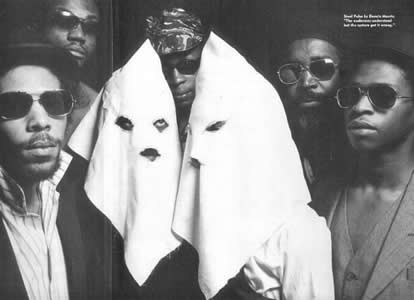 Steel Pulse entonces firmó con Elektra/Asylum, con quien sacaron un LP de su presentación como acto principal en el festival de Reggae Sunsplash del 1981. Su debut de estudio con estos lo fue True Democracy, producción que les marcó su retorno a temas de conciencia social. Esta fue su primera producción en penetrar las listas de éxitos en los Estados Unidos en las categorías de pop y R & B. Su próxima producción Earth Crisis introdujo al productor Jimmy “Senyah” Haynes substituyendo a los miembros originales Gabbidon y McQueen, quienes dejaron la banda al final de las sesiones de grabación. Eventualmente estos fueron sustituidos por Carlton Bryan en la guitarra y Alvin Ewen en el bajo para la producción de 1986 Babylon The Bandit. Este trabajo, producido por Haynes, fue hasta entonces su más pulida, y con su poderoso tema “Not King James Version” les ganó el premio Grammy de Mejor Álbum de Reggae.
Steel Pulse entonces firmó con Elektra/Asylum, con quien sacaron un LP de su presentación como acto principal en el festival de Reggae Sunsplash del 1981. Su debut de estudio con estos lo fue True Democracy, producción que les marcó su retorno a temas de conciencia social. Esta fue su primera producción en penetrar las listas de éxitos en los Estados Unidos en las categorías de pop y R & B. Su próxima producción Earth Crisis introdujo al productor Jimmy “Senyah” Haynes substituyendo a los miembros originales Gabbidon y McQueen, quienes dejaron la banda al final de las sesiones de grabación. Eventualmente estos fueron sustituidos por Carlton Bryan en la guitarra y Alvin Ewen en el bajo para la producción de 1986 Babylon The Bandit. Este trabajo, producido por Haynes, fue hasta entonces su más pulida, y con su poderoso tema “Not King James Version” les ganó el premio Grammy de Mejor Álbum de Reggae.
En 1988 Steel Pulse sacó State Of Emergency, su album menos roots hasta el momento. También contribuyeron el tema “Can’t Stand It” al álbum de la película Do The Right Thing del afamado director Spike Lee. En 1991 lanzaron el disco Victims, otra producción altamente comercial que incluyó el tema “Taxi Driver”. Esta producción les ganó otra nominación a los premios Grammy. A tono con el mencionado tema, radicaron una demanda de clase contra la Comision de Taxis y Limosinas de la ciudad de Nueva York por alegadamente discriminar contra darle servicio a los negros y en especial a los Rasta. En este año dejó la banda el miembro fundador Fonso Martin dejando solo el trio de Hinds, Nisbett y Brown como únicos miembros originales de Steel Pulse. Seguía con ellos Ewen y los acompañaban Clifford "Moonie" Pusey como guitarrista, Sidney Mills como tecladista, Kevin Batchelor como trompetista, Jerry Johnson como saxofonista y Clark Gayton como trombonista.
Su disco en vivo de 1992 Rastafari Centennial marcó el retorno de Steel Pulse nuevamente a sus raíces y les ganó otra nominación a los Grammy. El próximo año tocaron en la inauguración del presidente Bill Clinton, la primera vez que una banda de reggae participa en este tipo de evento. Su disco de 1994 Vex, a pesar de contar con algunos artistas de dancehall invitados y ser completamente grabado en digital siguió en la línea del reggae roots clásico. En 1997 Rage And Fury siguió en la misma línea y les ganó otra nominación a los premios Grammy. En 1999 lanzaron otra producción en vivo titulada Living Legacy.
Luego de siete largos años lanzaron su próxima producción African Holocaust. Para esta fecha solo quedaban David Hinds en las voces y guitarra rítmica y Selwyn Brown en el teclado y coros como miembros originales pero respaldados por una sólida banda. Como siempre, sigue siendo la música lo más importante y esta nueva alineación vive las expectativas de lo que se espera de Steel Pulse. Tanto Asi que African Holocaust les ganó otra nominación al Grammy de Mejor Álbum de Reggae del Año. Fanáticos de toda la cerrera de Steel Pulse ya saben que esperar. Para los que están experimentando su música, sepan que Steel Pulse se distingue por tocar canciones bien escritas, Afrocéntricas y rebeliosas pero sin ser negativas ni ofensivas y que aunque su alineación ha cambiado varias veces, no ha cambiado su clase de cancón, ni su movimiento a alejarse del dancehall que se introdujo un poco en sus álbumes anteriores. La música y el mensaje de Steel Pulse siguen siendo fiel a los principios y a la visión de la banda. 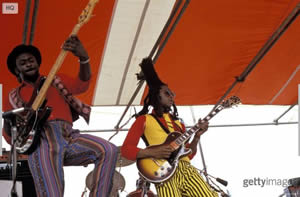
En términos de creatividad y de éxito comercial, Steel Pulse es una de las más grandes bandas de reggae de Inglaterra. Steel Pulse comenzó tocando reggae roots auténtico con toques de jazz y música latina y han ganado una sustancial fanaticada a través de todo el mundo. Handsworth Revolution, su álbum de debut de 1978 es considerado por los críticos como un clásico y un punto culminante en la historia del reggae británico. Para el final de los 80, Steel Pulse había ganado un premio Grammy y había experimentado con otras influencias. Eventualmente retornó al roots de su origen añadiendo toques de dancehall y hip-hop en el camino.
bio traducida de la página web oficial de Steel Pulse http://steelpulse.com/news.php
Steel Pulse
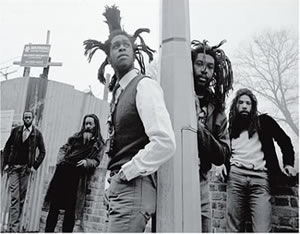 Steel Pulse was formed in 1975 in Birmingham, England, specifically the inner city area of Handsworth. The founding members were schoolmates David Hinds (the primary songwriter as well as the lead singer and guitarist), Basil Gabbidon (guitar), and Ronnie "Stepper" McQueen (bass). All of them came from working class West Indian immigrant families, and none had much musical experience. They took some time to improve their technical proficiency, often on Roots inspired material by the Wailers, Burning Spear and several other prominent Jamaican artists. McQueen suggested the group name, after a racehorse, and they soon fleshed out the lineup with drummer Steve "Grizzly" Nisbett, keyboardist/vocalist Selwyn "Bumbo" Brown, percussionist/vocalist Alphonso "Fonso" Martin, and vocalist Michael Riley.
Steel Pulse was formed in 1975 in Birmingham, England, specifically the inner city area of Handsworth. The founding members were schoolmates David Hinds (the primary songwriter as well as the lead singer and guitarist), Basil Gabbidon (guitar), and Ronnie "Stepper" McQueen (bass). All of them came from working class West Indian immigrant families, and none had much musical experience. They took some time to improve their technical proficiency, often on Roots inspired material by the Wailers, Burning Spear and several other prominent Jamaican artists. McQueen suggested the group name, after a racehorse, and they soon fleshed out the lineup with drummer Steve "Grizzly" Nisbett, keyboardist/vocalist Selwyn "Bumbo" Brown, percussionist/vocalist Alphonso "Fonso" Martin, and vocalist Michael Riley.
Steel Pulse initially had difficulty finding live gigs, as club owners were reluctant to give them a platform for their "subversive" Rastafarian politics. Luckily, the punk movement was opening up new avenues for music all over Britain, and also finding a spiritual kinship with protest reggae. Thus, the group wound up as an opening act for punk and new wave bands like the Clash, the Stranglers, Generation X, the Police, and XTC, and built a broad-based audience in the process. In keeping with the spirit of the times, Steel Pulse developed a theatrical stage show that leavened their social commentary with satirical humor; many of the members dressed in costumes that mocked traditional British archetypes (Riley was a vicar, McQueen a bowler-wearing aristocrat, Martin a coach footman, etc.). The band issued two singles -- "Kibudu, Mansetta and Abuku" and "Nyah Love" -- on small independent labels, when they then came to the attention of Island Records after opening for Burning Spear.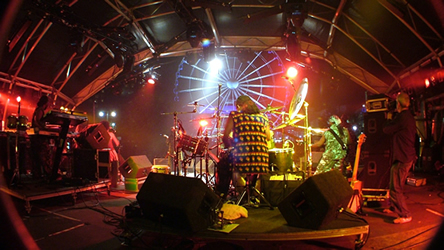
Steel Pulse's first single for Island was the classic "Ku Klux Klan," which happened to lend itself well to the band's highly visual, costume-heavy concerts. It appeared on their 1978 debut album, Handsworth Revolution, which was soon hailed as a classic of British reggae by many fans and critics, thanks to songs like the title track, "Macka Splaff," "Prodigal Son," and "Soldiers." Riley departed before the follow-up, 1979's Tribute to the Martyrs, which featured other key early singles in "Sound System" and "Babylon Makes the Rules," and solidified the band's reputation for uncompromising political ferocity. That reputation went out the window on 1980's Caught You, a more pop-oriented set devoted to dance tracks and lovers rock. By that point, Steel Pulse was keen on trying to crack the American market, and went on tour over Island's objections. Caught You was issued in the States as Reggae Fever, but failed to break the group, and they soon parted ways with Island.
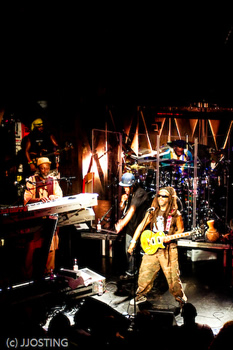 Steel Pulse moved on to Elektra/Asylum, which released an LP version of their headlining set at the 1981 Reggae Sunsplash Festival. Their studio debut was 1982's True Democracy, a generally acclaimed set that balanced bright, accessible production with a return to social consciousness. It became their first charting LP in America, making both the pop and R&B listings. The slicker follow-up, Earth Crisis, was released in 1984 and featured producer Jimmy "Senyah" Haynes subbing on guitar and bass for founding members Gabbidon and McQueen, both of whom left the group by the end of the recording sessions. They were replaced by guitarist Carlton Bryan and bassist Alvin Ewen for 1986's Babylon the Bandit, another Haynes-produced effort that ranked as the group's most polished, synth-centered record to date. It featured the powerful "Not King James Version" and won a Grammy for Best Reggae Album.
Steel Pulse moved on to Elektra/Asylum, which released an LP version of their headlining set at the 1981 Reggae Sunsplash Festival. Their studio debut was 1982's True Democracy, a generally acclaimed set that balanced bright, accessible production with a return to social consciousness. It became their first charting LP in America, making both the pop and R&B listings. The slicker follow-up, Earth Crisis, was released in 1984 and featured producer Jimmy "Senyah" Haynes subbing on guitar and bass for founding members Gabbidon and McQueen, both of whom left the group by the end of the recording sessions. They were replaced by guitarist Carlton Bryan and bassist Alvin Ewen for 1986's Babylon the Bandit, another Haynes-produced effort that ranked as the group's most polished, synth-centered record to date. It featured the powerful "Not King James Version" and won a Grammy for Best Reggae Album.
In 1988, Steel Pulse released State of Emergency, their most explicitly crossover-oriented album yet. They also contributed the track "Can't Stand It" to the soundtrack of Spike Lee's classic Do the Right Thing. In 1991, they released another heavily commercial album, the Grammy-nominated Victims, which featured the single "Taxi Driver." Backing up the song's views, Steel Pulse filed a class-action lawsuit against the New York City Taxi and Limousine Commission, charging that drivers discriminated against blacks and particularly Rastafarians. Founding member Fonso Martin left that year, reducing Steel Pulse to a core trio of Hinds, Nisbett, and Brown. Their backing band still featured Ewen and was elsewhere anchored by guitarist Clifford "Moonie" Pusey, keyboardist Sidney Mills, trumpeter Kevin Batchelor, Saxophonist Jerry Johnson and Trombonist Clark Gayton.
The 1992 live album Rastafari Centennial marked the beginning of a return to the group's musical roots, and earned another Grammy nomination. The following year, they performed at Bill Clinton's inaugural celebration, the first reggae band to appear at such an event. 1994's studio album Vex completed Steel Pulse's re-embrace of classic roots reggae, though it also nodded to contemporary dancehall with several guest toasters and a digital-flavored production. 1997's Rage and Fury continued in a similar vein, and was nominated for a Grammy. In 1999, the group released another collection of live performances, Living Legacy.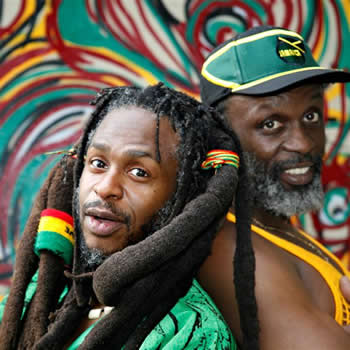
Fast forward a long seven years since their previous album, Rage and Fury, Steel Pulse would return yet again, this time with African Holocaust, and yet again have their ranks dwindled. Core members David Hinds (vocals, rhythm guitar) and Selwyn Brown (keyboards, backing vocals) are the only ones to remain from the band's original line-up, but they more than hold their own and they're joined by a deep roster of supporting musicians, a list too long to list. As always, the music is what's most important, and on that count, this Steel Pulse lineup indeed makes the mark. Granted, it did take them seven years to get the album out, but still it won a Grammy Awards Nomination for Best Reggae Album of the year. There's really not too much else to say about African Holocaust. Longtime fans will know what to expect. Newcomers should know a few things: above all, Steel Pulse are known for performing well-written, Afrocentric songs that are rebellious without being negative or inflammatory, and though the band membership has changed over the years, the type of songs hasn't, nor has the steady move away from dancehall that was apparent on the band's previous album. the message and music remain true to the band's principles and vision.
Steel Pulse is one of Britain's greatest reggae bands, in terms of creative and commercial success. Steel Pulse started out playing authentic roots reggae with touches of jazz and Latin music, and earned a substantial audience worldwide. Their 1978 debut, Handsworth Revolution, is still regarded by many critics as a landmark and a high point of British reggae. By the late '80s, Steel Pulse had won a Grammy and were working full-fledged crossover territory. They subsequently returned to a tough-minded, rootsy sound and have added touches of dancehall and hip-hop along the way.
bio taken from Steel Pulse official webpage http://steelpulse.com/news.php
 Steel Pulse se formó en la zona de Handsworth en el interior de Birmingham, Inglaterra en el 1975. La banda fue fundada por los compañeros de clase David Hinds como compositor principal, cantante y guitarrista, Basil Gabbidon también en la guitarra y Ronnie “Stepper” McQueen como bajista. Los tres venían de familias de clase trabajadora inmigrantes de las islas del Caribe y sin mucha experiencia en la música. Dedicaron su tiempo a mejorar su técnica mayormente practicando material roots inspirado en los Wailers y Burning Spear, entre otros prominentes artistas Jamaiquinos. McQueen sugirió el nombre para la banda Steel Pulse inspirado en un caballo de carrera del mismo nombre. Completaron la alineación con Steve “Grizzly” Nisbett en la batería, Selwin “Bumbo” Brown en los teclados y voces, Alphonso “Fonso” Martin en la percusión y voces, y el vocalista Michael Riley.
Steel Pulse se formó en la zona de Handsworth en el interior de Birmingham, Inglaterra en el 1975. La banda fue fundada por los compañeros de clase David Hinds como compositor principal, cantante y guitarrista, Basil Gabbidon también en la guitarra y Ronnie “Stepper” McQueen como bajista. Los tres venían de familias de clase trabajadora inmigrantes de las islas del Caribe y sin mucha experiencia en la música. Dedicaron su tiempo a mejorar su técnica mayormente practicando material roots inspirado en los Wailers y Burning Spear, entre otros prominentes artistas Jamaiquinos. McQueen sugirió el nombre para la banda Steel Pulse inspirado en un caballo de carrera del mismo nombre. Completaron la alineación con Steve “Grizzly” Nisbett en la batería, Selwin “Bumbo” Brown en los teclados y voces, Alphonso “Fonso” Martin en la percusión y voces, y el vocalista Michael Riley.  La banda consiguió guisos abriéndole a bandas punk y new wave como The Clash, The Stranglers, Generation X, The Police y XTC, así creando una buena base de seguidores. Siguiendo con las costumbres de la época, desarrollaron un show teátrico con disfrazes burlándose de las figuras de poder en Londres. Steel Pulse sacó dos sencillos, “Kibudu Mansetta and Abuku” y “Nyah Love” bajo un sello independiente antes de llamar la atención de Island Records luego de abrirle un concierto a Burning Spear.
La banda consiguió guisos abriéndole a bandas punk y new wave como The Clash, The Stranglers, Generation X, The Police y XTC, así creando una buena base de seguidores. Siguiendo con las costumbres de la época, desarrollaron un show teátrico con disfrazes burlándose de las figuras de poder en Londres. Steel Pulse sacó dos sencillos, “Kibudu Mansetta and Abuku” y “Nyah Love” bajo un sello independiente antes de llamar la atención de Island Records luego de abrirle un concierto a Burning Spear. Steel Pulse entonces firmó con Elektra/Asylum, con quien sacaron un LP de su presentación como acto principal en el festival de Reggae Sunsplash del 1981. Su debut de estudio con estos lo fue True Democracy, producción que les marcó su retorno a temas de conciencia social. Esta fue su primera producción en penetrar las listas de éxitos en los Estados Unidos en las categorías de pop y R & B. Su próxima producción Earth Crisis introdujo al productor Jimmy “Senyah” Haynes substituyendo a los miembros originales Gabbidon y McQueen, quienes dejaron la banda al final de las sesiones de grabación. Eventualmente estos fueron sustituidos por Carlton Bryan en la guitarra y Alvin Ewen en el bajo para la producción de 1986 Babylon The Bandit. Este trabajo, producido por Haynes, fue hasta entonces su más pulida, y con su poderoso tema “Not King James Version” les ganó el premio Grammy de Mejor Álbum de Reggae.
Steel Pulse entonces firmó con Elektra/Asylum, con quien sacaron un LP de su presentación como acto principal en el festival de Reggae Sunsplash del 1981. Su debut de estudio con estos lo fue True Democracy, producción que les marcó su retorno a temas de conciencia social. Esta fue su primera producción en penetrar las listas de éxitos en los Estados Unidos en las categorías de pop y R & B. Su próxima producción Earth Crisis introdujo al productor Jimmy “Senyah” Haynes substituyendo a los miembros originales Gabbidon y McQueen, quienes dejaron la banda al final de las sesiones de grabación. Eventualmente estos fueron sustituidos por Carlton Bryan en la guitarra y Alvin Ewen en el bajo para la producción de 1986 Babylon The Bandit. Este trabajo, producido por Haynes, fue hasta entonces su más pulida, y con su poderoso tema “Not King James Version” les ganó el premio Grammy de Mejor Álbum de Reggae. Steel Pulse was formed in 1975 in Birmingham, England, specifically the inner city area of Handsworth. The founding members were schoolmates David Hinds (the primary songwriter as well as the lead singer and guitarist), Basil Gabbidon (guitar), and Ronnie "Stepper" McQueen (bass). All of them came from working class West Indian immigrant families, and none had much musical experience. They took some time to improve their technical proficiency, often on Roots inspired material by the Wailers, Burning Spear and several other prominent Jamaican artists. McQueen suggested the group name, after a racehorse, and they soon fleshed out the lineup with drummer Steve "Grizzly" Nisbett, keyboardist/vocalist Selwyn "Bumbo" Brown, percussionist/vocalist Alphonso "Fonso" Martin, and vocalist Michael Riley.
Steel Pulse was formed in 1975 in Birmingham, England, specifically the inner city area of Handsworth. The founding members were schoolmates David Hinds (the primary songwriter as well as the lead singer and guitarist), Basil Gabbidon (guitar), and Ronnie "Stepper" McQueen (bass). All of them came from working class West Indian immigrant families, and none had much musical experience. They took some time to improve their technical proficiency, often on Roots inspired material by the Wailers, Burning Spear and several other prominent Jamaican artists. McQueen suggested the group name, after a racehorse, and they soon fleshed out the lineup with drummer Steve "Grizzly" Nisbett, keyboardist/vocalist Selwyn "Bumbo" Brown, percussionist/vocalist Alphonso "Fonso" Martin, and vocalist Michael Riley.
 Steel Pulse moved on to Elektra/Asylum, which released an LP version of their headlining set at the 1981 Reggae Sunsplash Festival. Their studio debut was 1982's True Democracy, a generally acclaimed set that balanced bright, accessible production with a return to social consciousness. It became their first charting LP in America, making both the pop and R&B listings. The slicker follow-up, Earth Crisis, was released in 1984 and featured producer Jimmy "Senyah" Haynes subbing on guitar and bass for founding members Gabbidon and McQueen, both of whom left the group by the end of the recording sessions. They were replaced by guitarist Carlton Bryan and bassist Alvin Ewen for 1986's Babylon the Bandit, another Haynes-produced effort that ranked as the group's most polished, synth-centered record to date. It featured the powerful "Not King James Version" and won a Grammy for Best Reggae Album.
Steel Pulse moved on to Elektra/Asylum, which released an LP version of their headlining set at the 1981 Reggae Sunsplash Festival. Their studio debut was 1982's True Democracy, a generally acclaimed set that balanced bright, accessible production with a return to social consciousness. It became their first charting LP in America, making both the pop and R&B listings. The slicker follow-up, Earth Crisis, was released in 1984 and featured producer Jimmy "Senyah" Haynes subbing on guitar and bass for founding members Gabbidon and McQueen, both of whom left the group by the end of the recording sessions. They were replaced by guitarist Carlton Bryan and bassist Alvin Ewen for 1986's Babylon the Bandit, another Haynes-produced effort that ranked as the group's most polished, synth-centered record to date. It featured the powerful "Not King James Version" and won a Grammy for Best Reggae Album.